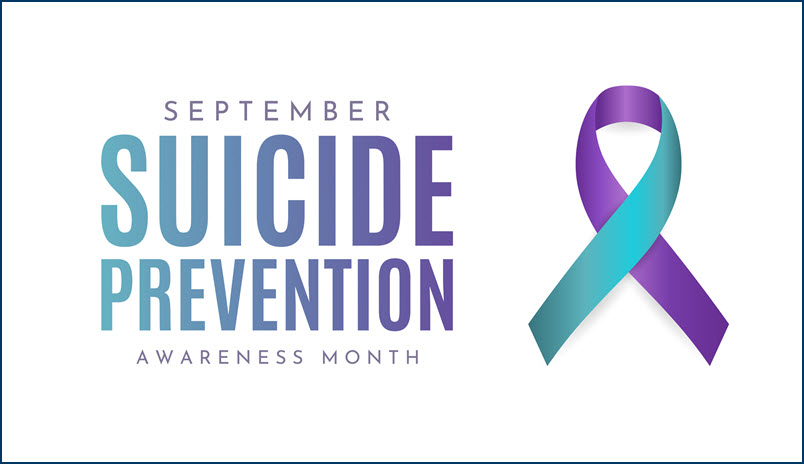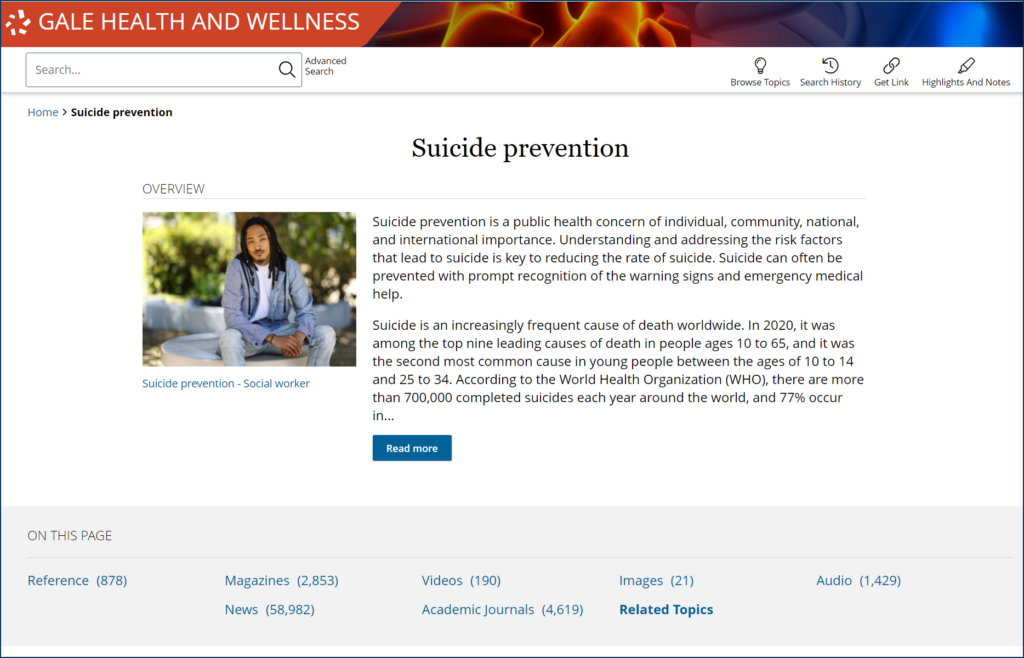| By Gale Staff |
In recent years, mental health concerns have soared, especially throughout the COVID-19 pandemic and its fallout. According to the Centers for Disease Control and Prevention (CDC), more than 20% of U.S. adults live with a mental illness, and adolescent statistics are just as high. Rising suicide rates are of particular concern as suicide is one of the country’s leading causes of death, especially for young people.
Suicide is a profoundly complicated topic entrenched in stigma and false information. Suicide itself is not a mental disorder, but mental health concerns (including depression, bipolar disorder, substance use disorder, and schizophrenia) can cause someone to take their own life. Therefore, the two issues are inextricably linked. Highlighting the facts and raising awareness for mental health resources are vital steps to addressing the high suicide rates in this country.
September is National Suicide Prevention Awareness Month, providing an important platform to discuss the facts about suicide, warning signs, and treatments for related mental health disorders. Gale databases can assist these efforts in two spaces that are uniquely poised to offer help and hope: college campuses and public libraries. With Gale Health and Wellness, campus staff and community librarians can raise awareness for suicide prevention and encourage students and patrons to seek support.
Gale Health and Wellness is an easy-to-navigate database with a dedicated suicide prevention topic page containing valuable articles, peer-reviewed journals, videos, and related podcasts. This September, academic and public libraries can leverage this resource and expand their presence as a hub for reliable information and support even on the toughest topics.
Destigmatize Mental Health and Suicide on Campus
For campuses across America, mental health and suicide prevention are critical issues for everyone in our communities to help address. College students are especially susceptible to mental health concerns and situations that can lead to suicidal ideation. For many, leaving for college is their first significant period away from home and their normal support systems. Plus, university students face a range of distinct stressors, including academic pressure, financial burdens, and increased access to alcohol and other mood-altering substances.
With those factors in mind, it’s not surprising that mental health diagnoses are particularly high among college students. A 2023 survey from the American College Health Association revealed that more than 75% of the study’s 55,000 participating college students were experiencing moderate to severe mental distress—with depression and anxiety among their most commonly diagnosed mental health disorders. Nationally, suicide is the second-leading cause of death among college students.
College libraries can serve an important role in promoting mental health awareness on campus and destigmatizing asking for help. Using Gale Health and Wellness, consider engaging in the following initiatives for Suicide Prevention Awareness Month.
Debunk the Myths with a Social Media Campaign
Read through the suicide prevention summary and make note of anything that surprised you. Create a list of facts about suicide to share across your campus social media channels throughout September. For example:
- Talking about suicide can actually reduce the risk of suicide. Addressing suicidal thoughts in an open conversation can be the first step toward treatment.
- Many people who die by suicide do not have a diagnosed mental health disorder—suicidal thoughts are typically situation-specific. With help, suicidal ideation will pass.
- Anyone can ask for help, especially those concerned for someone else. Anyone can use the National Suicide & Crisis Lifeline. By calling or texting 988, you can immediately connect with a trained counselor.
Dismantle the Stigma Around Mental Health Treatment
College campuses are exceptionally diverse, blending students from various cultural backgrounds. Different cultures have unique beliefs and biases about mental health and suicide.
Gale Health and Wellness houses information about mental health stigma and tips for reaching different student populations. Collaborate with other campus student services to provide information about mental health services in spaces frequented by more vulnerable populations. You might also consider direct, proactive outreach to student organizations on how to help work through community-specific issues.
Transform the Public Library into a Mental Health Hub
The public library is a trusted community resource. Libraries often provide language-learning tools, access to technology, and a friendly face. It is an accessible, welcoming space for people of all ages and backgrounds. As such, public libraries tend to serve more vulnerable populations, including people experiencing homelessness, low-income families, older adults, and immigrants.
Libraries can provide important tools during times of crisis and for people experiencing high-stress situations. Public libraries stimulate community dialogue. During Suicide Prevention and Awareness Month, do your part to share vital information with your patrons.
Share Reliable and Accessible Information
Your Gale Health and Wellness subscription provides a one-stop shop for reliable information about suicidal ideation, mental health disorders, and treatment options. Users can trust our content and find comfort in the portal’s unbiased, authoritative approach. Library patrons get free access to these resources, and we ensure content is available for everyone.
For users with learning differences or visual disabilities, Gale databases include text-to-speech software that patrons can download to their personal devices. Users can adjust the text (color, size, spacing, and font) to better customize information. As part of your outreach, highlight information available through various formats, such as videos and podcasts, to engage patrons in this critical topic.
Using the ready-made marketing tools from Gale’s support team, you can raise awareness for your Gale Health and Wellness subscription.
Develop a Community Resource Kit
Develop a simple take-home brochure or one-sheeter featuring resources to address suicide prevention. Using the helpful, topical articles in Gale, distill key information into bulleted, easy-to-digest facts. You could list affordable counselors in the area, crisis hotlines, support networks, or firearm relinquishment options. Gale Health and Wellness hosts a wealth of content that you can direct readers to, and we’re constantly updating the database to provide the most relevant information.
Host a Guest Speaker
Talking about suicide prevention is a significant step toward helping those suffering from suicidal ideation. It helps individuals understand that they are not alone and that those feelings can pass. This September, public libraries can host an expert guest speaker to shed some light on this complex topic. Consider a local mental health counselor or medical expert who can discuss the warning signs and recommended interventions.
Although September is Suicide Prevention Awareness Month, we should share these resources and spread awareness year-round. Gale Health and Wellness allows your space, whether a campus or public library, to provide reliable information to those seeking support. If your institution is not a Gale subscriber, contact a representative with any questions and to access a trial.
If you or someone you know is experiencing thoughts of suicide, call or text 988 for immediate assistance.



